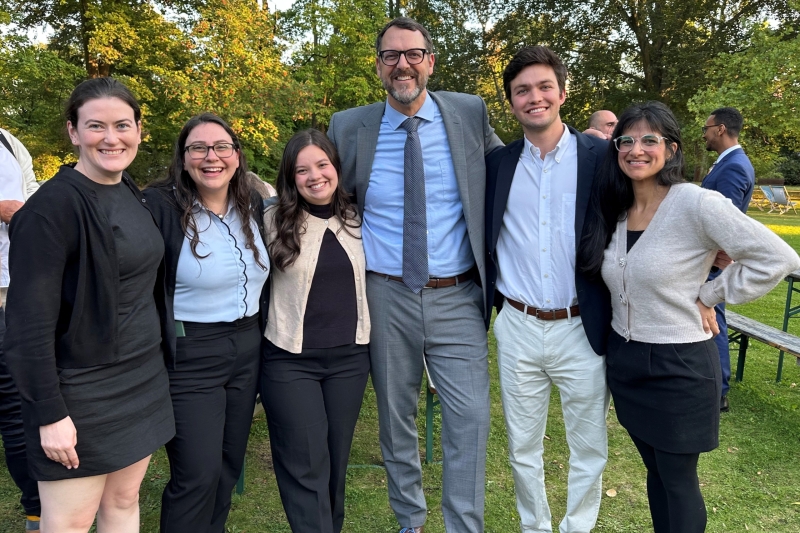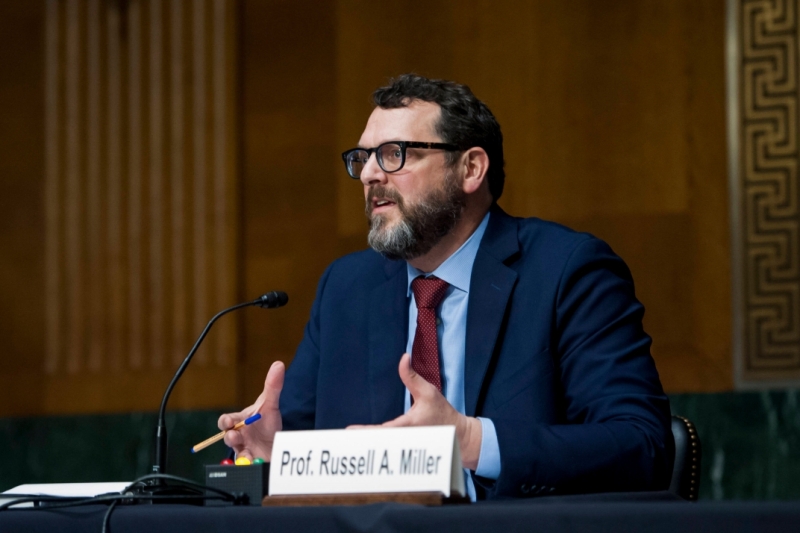Faculty Spotlight: Russell Miller Professor Russell Miller's latest book offers students, comparative law scholars, and practitioners an introduction to and survey of the German legal system.
Serendipity. Russell Miller uses that word when he talks about the twists and turns his career has taken. Principally, an unexpected development led Miller from defending death row inmates to exhaustively examining the German legal system.
When he graduated from law school at Duke, Miller was heading toward a career in human rights law, focused in particular on death penalty defense work. He didn’t speak a word of German, had never traveled abroad, didn’t even have a passport. Then, he took a job as a staff attorney with the Arizona Capital Representation Project where he worked with a small team of lawyers on death penalty appeals. One of those cases involved the Apelt brothers, Michael and Rudi, who were German nationals under a death sentence on Arizona’s death row.
“I was the youngest member of the team representing the Apelts. My boss gave me the task of regularly meeting representatives from the German consulate, which was actively supporting our work on the case. I met these consular officials once a month, briefed them on the status of the case, coordinated their support, and drove them to the prison to meet our clients,” said Miller, the J. B. Stombock Professor of Law at W&L.
During those drives into the Sonoran Desert, Miller struck up a friendship with the German officials, and they urged him to consider going to Germany one day. They even suggested possible fellowships he might pursue. Miller eventually took their advice, applying for and receiving a fellowship from the Robert Bosch Foundation. Once in Germany, Miller proceeded to talk his way into an unprecedented internship with the Bundesverfassungsgericht (Federal Constitutional Court), Germany’s highest court. That was followed by an equally remarkable internship at the European Court of Human Rights in Strasbourg, France. The latter tribunal hears cases asserting international human rights violations against Germany and more than 40 other European countries.
“It was classic American hubris that got me those two assignments that had never been given to Bosch fellows before,” Miller conceded. “They told me that they’d unsuccessfully tried to secure internships at those courts in the past, and I said, ‘Let’s try one more time.’”
The year was transformative for Miller, and it all began, unexpectedly, on the road to Arizona’s death row. “Maybe there is an overarching message for our students in this story,” said Miller. “You have to be really committed to something, and engaged with it, and energetic about your work. And then, you have to be prepared for serendipity to come along. I’ve seen that over and over in my career as opportunities I had not anticipated surface. Then you have to have the courage to grab those chances.”
His year as a Bosch Fellow not only introduced him to German law and culture, but also marked his shift from criminal law and death penalty work to what has become his academic and research interest: comparative constitutional law. “The experience provided a credible break point in my practice where I could move to the academy,” he said. “When you’re practicing law, it’s hard to find the time to write scholarship and to present yourself as interested in research and teaching.”
During his internship at the Federal Constitutional Court, Miller and a fellow clerk, Peer Zumbansen, started a bi-weekly newsletter designed to provide English-speaking lawyers with greater insight into German constitutional law. As Miller recounts, the two aspiring scholars would put a bottle of wine on a table in Frankfurt and start writing. When they were finished with the essays and reports, and maybe the bottle of wine as well, they would email the newsletter to friends and colleagues. From those humble but passionate beginnings, the German Law Journal was born. In Google Scholar’s impact rankings, it is now the top-ranked journal in the fields of international law and European law. This year, the German Law Journal cracked the global top-ten ranking for all law journals in all fields.
The Journal has been headquartered in the School of Law since Miller arrived at W&L in 2008, and student editors are involved in all phases of its production and administration, including working with scholars from around the world. In September 2024, the German Law Journal celebrated its 25th anniversary with a program in Berlin featuring keynote addresses from the ministers of justice of both Germany and Poland.
While he was celebrating that major milestone with the law journal he founded, Miller was also excited about the publication of his new book, “An Introduction to German Law and Legal Culture.” The 500-page volume is being published by Cambridge University Press as part of its “Law in Context” textbook series.
Designed for students, comparative law scholars, and practitioners, the book offers an introduction to and survey of the German legal system. The book accepts that German legal culture is predominantly shaped by the European civil law tradition. But Miller challenges that orthodoxy by considering the influence other traditions have had on German law, including socialist law, the common law tradition, the Islamic legal tradition, and European law. The special value – and challenge – in confronting the German legal system, said Miller, is that Germans think of law as a science.
“They have convinced themselves, and maybe the world, that the product of their legal thinking is something like the product of scientific analysis and logic,” Miller said. “To the degree that you don’t have different versions of gravity around the world, the Germans have asserted a similarly objective understanding of the law that makes their approach more transferable. Everywhere you go, for example, their approach to analyzing a criminal case should be the correct approach.”
Although the book is aimed at an English-speaking audience, Miller said it has found a surprising audience. When presenting the book in Germany he repeatedly hears from German students and practitioners who say that they would have benefitted from the kind of overview his book provides.
Teaching comparative legal systems has many practical advantages, said Miller. He’s had W&L alumni report that merely dabbling in German law has paid dividends for them in practice. They describe the value of their work in Miller’s classes or with the German Law Journal when their firm opened an office in Germany, or they were appointed as American co-counsel in a case based in Germany. There’s a more theoretical or academic dimension that Miller emphasizes as well. Students’ encounter with a foreign legal system helps them develop and refine the skills they need when engaging with people – clients or attorneys – from different cultures and backgrounds.
Miller insists that his interactions with W&L’s students are indispensable parts of his research. Students in his comparative law seminar helped him vet chapters of his book. But his time in the classroom also gives him an opportunity to engage with new ideas. In the last year or so, Miller has explored a new theory of the doctrine of stare decisis in his constitutional law class. This led to the publication of two major articles exploring the purpose and practice of precedent at the Supreme Court before and after the Dobbs decision.
“Talking with students and getting their reactions to the question of precedent was invaluable,” Miller said. “In some ways it would be artificial for us to keep opening the casebook every year without recognizing that the very theory that justifies using cases to learn the law is now in question.”
For Miller, the dynamic that mixes world-class research efforts and total dedication to teaching is what makes W&L Law special.
“This is a particular privilege at Washington and Lee,” he said. “We have amazing, brilliant, sincere, and engaged students. It’s part of our ethos here that we have managed to have civil conversation with these smart kids. I feel super lucky to have this time with them.”
If you know any W&L faculty who would be great profile subjects, tell us about them! Nominate them for a web profile.
 Celebrating the GLJ: L-R Caroline Martin ’26L, Yardley Borten ’25L, Mikayla Nasis ’25L, Russell Miller, Ben Wood ’26L, and Vimi Shad ’09L
Celebrating the GLJ: L-R Caroline Martin ’26L, Yardley Borten ’25L, Mikayla Nasis ’25L, Russell Miller, Ben Wood ’26L, and Vimi Shad ’09L Prof. Russell Miller testifying before U.S. Congress
Prof. Russell Miller testifying before U.S. Congress
You must be logged in to post a comment.